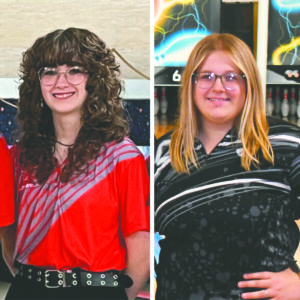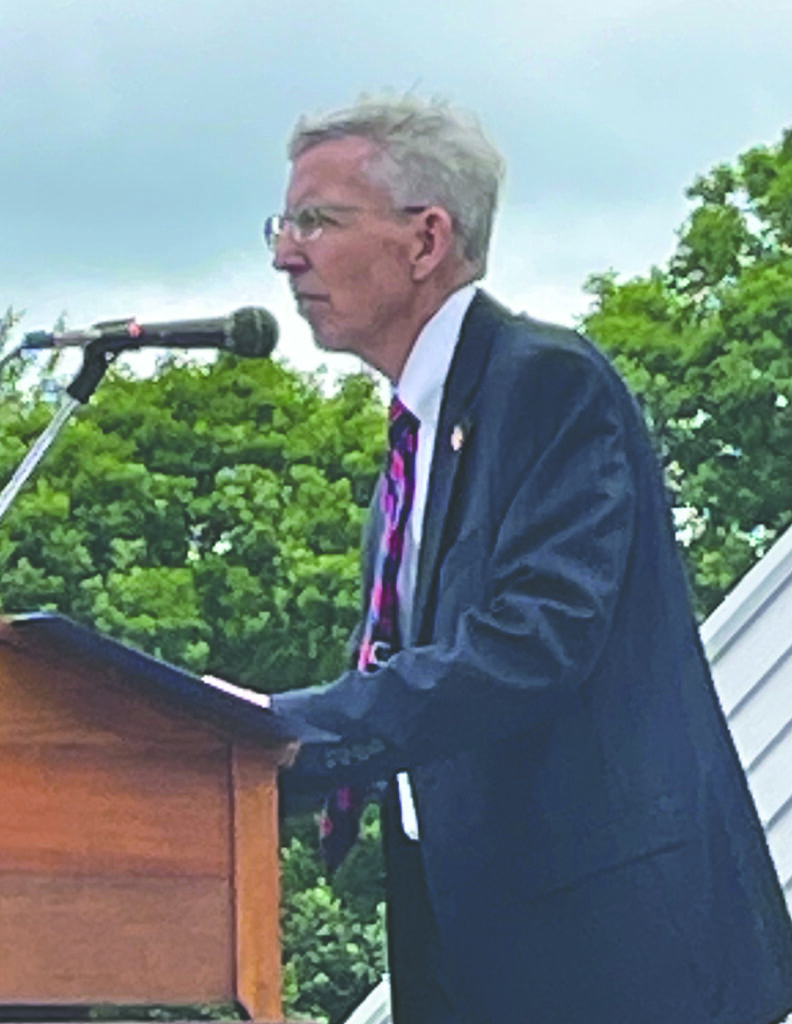330-476-6343 | [email protected]

330-476-6343 | [email protected]

By Carol McIntire
Editor
Sean Smith shared words from his father’s “little black book” that drove home the cost of freedom during the May 27 Memorial Day observance at Westview Cemetery in Carrollton.
Smith, Carroll County probate and juvenile court judge, said he never had the honor of wearing the uniform of his country, but his dad, Seaman First Class, Robert C. H. “Bob” Smith, and the dads and moms of his friends all proudly served their country.
It wasn’t until after his father died in the spring of 1974 that he stumbled upon a little journal he kept during his war years: a little black book clipped shut with a button from the USO.
The journal shared how, in the span of 27 days, his dad lost 149 fellow sailors, shipmates and friends during World War II.
The journal told how, on 28 August 1942, he and many “swell” shipmates sailed aboard the SS Firethorn from New York Harbor bound for a trip around the world.
“But on the early morning of October 7 at 8:35 a.m., while on watch, we were torpedoed twice on the port side. The ship went down in 90 seconds, taking the lives of 14 good seamen and true Americans, two of them belonging to my gunnery station. I, and the rest of my shipmates had a narrow escape. We got away on four small rafts with very little provisions.”
The men were in those rafts for two days.
“They were two days spent in misery, pain and horror as the sea was rough and storm was raging. Some of the men were seriously injured,” he wrote.
The men were picked up by a small English corvette and taken ashore in Cape Town, South Africa, where they learned their ship was sunk 80 miles from shore.
After 11 days, the crew boarded a Dutch ship, the SS Zandaam, which was to carry them back to the shores of America.
“But fate intercepted us once more – this time at 4:15 p.m. on November 20 and again, I was on watch. We took two torpedoes to the port side. It took the ship about 10 minutes to disappear into her watery grave, taking with her 132 of my fellow shipmates. But God was with me, and again, I escaped the clutches of fate,” Smith related, reading from the journal of his father.
The 1974 Carrollton High School graduate shared how his father made it into a lifeboat and the men were commanded to row toward shore.
“But as we did, we could hear the cries of death from our fellow mates who were perishing in the seas. Yet it was impossible to do anything for them. We had already overloaded our lifeboat and the most we could do was try to make land and get help for them. But this proved no good because it was five long days before we were picked up by an American tanker by the name of Gulf State. It was too late because our shipmates could not have lived that long. The sea had won once more,” the journal pages read.
After the men were taken aboard the tanker, three men died after struggling to live for five days.
“I think he was always haunted by their memory,” Smith told the crowd. “I think he could still see their faces and their smiles; he could still hear their laughs and their final cries. And he asked, ‘Why them? Why not me?’”
Smith paid tribute to the many servicemen and women who have never come home.
“We owe everything to these great Americans, our comforts, our freedoms, our entire way of life,” he said.
In closing, Smith asked the crowd, “What are we to do?”
First, he said, we must recognize that these fallen patriots have entrusted us with a sacred obligation. That great trust is now in our hands. We must allow it to sink deep into our hearts. It is clear to me that we have a duty to those who have gone before us, and especially to those who have paid the ultimate sacrifice, to preserve, and protect, and enhance, that more perfect union of which our forefathers dreamt. To do the hard work of promoting peace; to build upon and advance those great principles upon which this nation was founded – freedom, liberty, equality, justice – and to notably pursue the conviction that our 50 states are indeed, one nation, under God, indivisible. We can pay no greater honor to those in these flower and flag decked graves than that.”
Interested in a monthl roundup of stories? Enter your email to be added to our mailing list.
